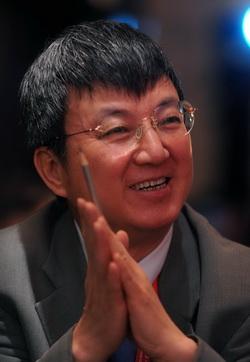Appointment reflects nation's increasing financial prowess
People's Bank of China Deputy Governor Zhu Min was named Thursday as special advisor to the International Monetary Fund's (IMF) managing director, giving further impetus to China's lead role in reshaping the global financial order.

Zhu Min, deputy governor at People's Bank of China, named Thursday as special advisor to the International Monetary Fund's (IMF) managing director.
Zhu, 57, who joined the central bank last year after more than a decade as a senior executive in Bank of China, is expected to take up his new position on May 3, the IMF said in a statement.Zhu's participation will help the fund "strengthen its understanding of Asia and the emerging markets", said Dominique Strauss-Kahn, managing director of the IMF.
"As special advisor, he will play an important role in working with me and my management team in meeting the challenges facing our global members," he said.
Bigger role
The appointment comes at a time when China and other emerging economies are seeking a bigger role in multilateral financial institutions, as their economies have become vital engines of the global economic growth.
Officials and experts said Zhu's designation, the highest ever IMF position attained by a Chinese official, will help give more voice to Asian and developing countries in the decision-making process of the fund.
"Zhu's new post, following Justin Lin's earlier appointment at the World Bank, marks the beginning of a general trend that China, with its rising economic prowess, will have a better hearing in the global economic arena," Yao Jian, a spokesman of the Ministry of Commerce, said Thursday.
"It is reasonable and necessary for China to seek a change in the global financial architecture, so as to better reflect the changing global economic landscape," said Wang Zhimin, professor of international relations at the University of International Business and Economics in Beijing.
The governance structure of the IMF, dominated by the US and European countries have been under criticism, especially since the outbreak of the financial crisis.
Developed countries now hold 57 percent of the voting rights at the IMF, with the US alone controlling 17 percent. China holds only 3.7 percent of the IMF vote and is less influential than Germany, which has 5.9 percent, despite the fact that it has overtaken the European country as the third largest economy in the world.
The emerging BRIC countries - Brazil, Russia, India and China - account for 9.62 percent of the IMF's total voting rights and are seeking a reduction of the share of developed countries to 50 percent from the current 57 percent.
Historic opportunity
Pang Zhongying, professor of international relations at Renmin University of China, said Zhu's appointment is a historic opportunity for the nation as it marks a significant step in forging closer relationships with multilateral financial institutions.
However, Pang said the new role at the fund could also be a challenge for Zhu. "He will inevitably face pressure and complaints from Western countries when promoting deeper reform at the fund," he said.





